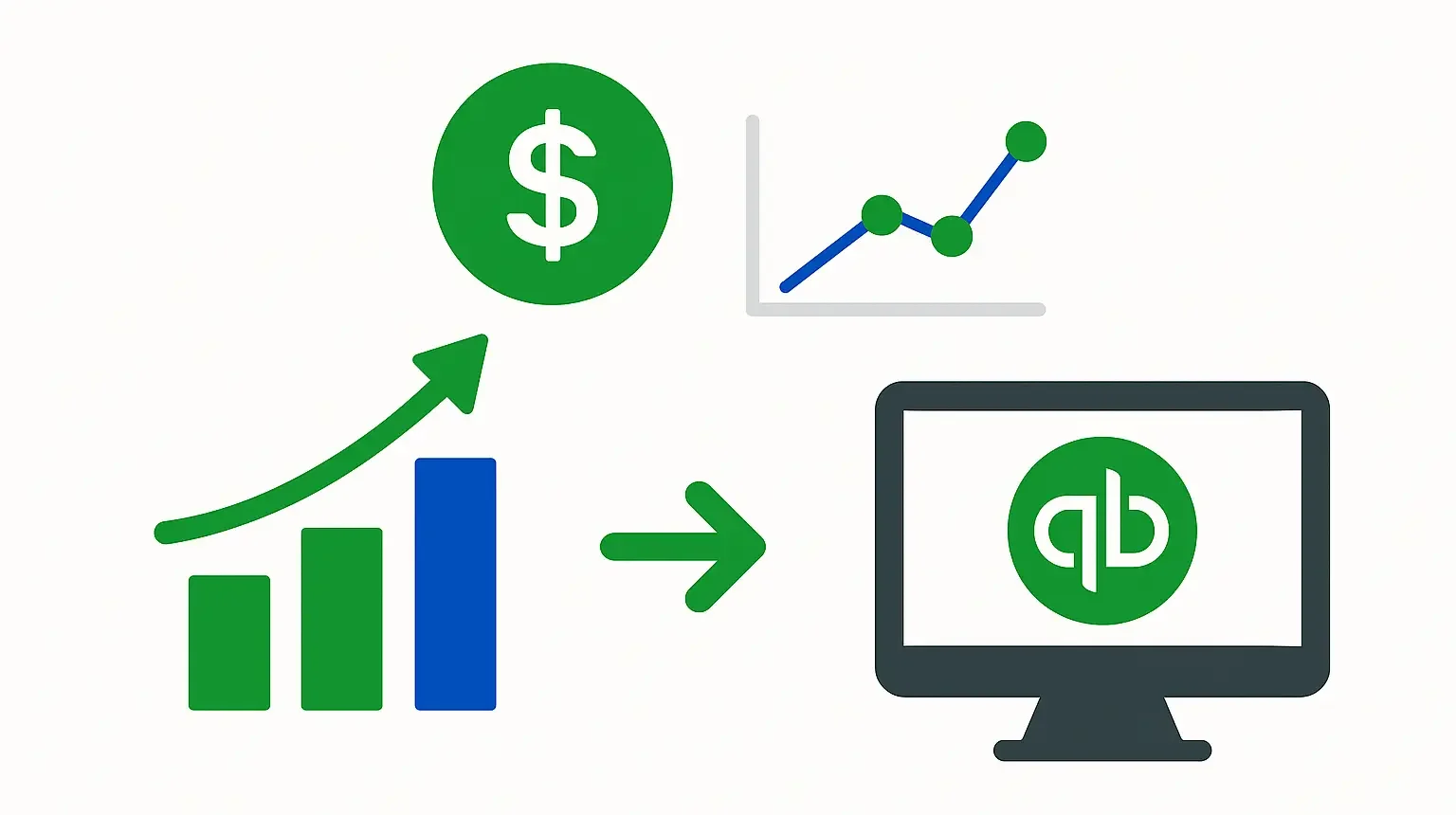Running a business is tough. Growth sounds exciting, but it also brings new challenges. More transactions, tighter cash flow, and the pressure to make smart financial decisions. That’s where QuickBooks comes in. And if you’re an accountant, you already know how powerful it can be when used the right way.
This guide will show how QuickBooks supports business growth, the features accountants lean on, and how to get the most from the software as a company scales.
What you’ll learn:
- Why QuickBooks is more than just bookkeeping
- How accountants use QuickBooks to help clients grow
- The tools and reports that make a real difference
What makes QuickBooks useful for business growth?
QuickBooks isn’t just about recording income and expenses. It’s designed to help businesses grow with clear financial insights and built-in tools that make scaling easier.
Core features that support small business scaling
Think of the basics first: invoicing, payments, payroll, and expense tracking. These keep the lights on. But as a business grows, QuickBooks steps up with job costing, budgeting, and custom reports that make sense of the bigger picture.
Why accountants recommend QuickBooks to growing businesses
Most accountants suggest QuickBooks because it saves time and reduces errors. Instead of chasing spreadsheets, you can get real-time financial data in a few clicks. And with QuickBooks Online, accountants and clients can look at the same numbers anytime, anywhere.
Growth-focused tools vs. basic bookkeeping
Here’s the difference: bookkeeping records what happened yesterday. Growth-focused tools in QuickBooks help you plan for tomorrow. Think forecasts, cash flow tracking, and trend reports. That’s where the software really shines.
How can accountants use QuickBooks to help clients grow?
Accountants aren’t just number crunchers anymore. They’re advisors. And QuickBooks is the platform that lets them do it well.
Tracking cash flow and profitability in QuickBooks
Cash flow makes or breaks a growing business. With QuickBooks, you can see if money is moving in and out as it should. Accountants can set up custom dashboards that highlight cash shortages before they become serious problems.
Using job costing, project tracking, and budgets
A construction company might want to know if a project is profitable before it ends. A marketing agency may want to track billable hours against budgets. QuickBooks has features for both, making it easy to match actuals against estimates.
Custom reporting for strategic decision-making
Here’s where accountants add real value. Custom reports in QuickBooks can show which products make the most money, which clients pay late, or which months are busiest. Those insights help owners make smarter calls about hiring, investing, or cutting costs.
What QuickBooks features support automation and efficiency?
Growth often means doing more with less. That’s where automation in QuickBooks matters.
Automated invoicing and payment collection
No one likes chasing payments. QuickBooks can send invoices automatically, remind clients who are late, and even let customers pay online. For a business owner, that means faster cash flow without awkward phone calls.
Payroll and tax management for scaling businesses
Hiring means payroll headaches. QuickBooks takes care of calculating wages, tax deductions, and year-end forms. For accountants, it reduces the risk of mistakes and keeps businesses compliant with local laws.
Third-party app integrations that expand QuickBooks
Need inventory management? CRM tools? E-commerce syncing? QuickBooks connects with hundreds of apps. For a retailer, that could mean tracking sales across Shopify and Amazon directly in QuickBooks. For a service business, it could mean linking project management software to invoices.
What version of QuickBooks is best for growing businesses?
Not every QuickBooks plan is built the same. Choosing the right one depends on where the business is in its growth journey.
QuickBooks Online vs. Desktop for growth
Desktop used to be the gold standard. It’s powerful, but it requires installation and manual updates. QuickBooks Online is cloud-based, meaning real-time collaboration, automatic updates, and better scalability. For most growing businesses, Online is the way forward.
Essentials, Plus, and Advanced plans compared
- Essentials: Good for basic needs like invoicing and bill management.
- Plus: Adds inventory and project tracking – ideal for businesses starting to scale.
- Advanced: Built for larger teams, with custom reporting, automation, and dedicated support.
Our blog explains whatever you need to know about What version of QuickBooks do you need.
When to upgrade to QuickBooks Advanced
If you’re hitting reporting limits, need more users, or require deeper insights, Advanced usually makes sense. It’s often the point where businesses outgrow spreadsheets and basic bookkeeping altogether.
How can QuickBooks reports guide smarter business decisions?
Data is only useful if you can understand it. QuickBooks reports turn raw numbers into insights that business owners can actually use.
Profit and Loss insights for growth planning
The P&L isn’t just about taxes. It shows trends. Are expenses creeping up? Is revenue steady or seasonal? Accountants use these reports to guide clients on where to focus their energy.
Balance sheet tracking for financial health
The balance sheet gives a snapshot of assets, liabilities, and equity. A strong balance sheet can help a business secure loans or attract investors. Accountants often use it to explain whether a business is truly in a position to expand.
Cash flow forecasts for long-term scaling
QuickBooks can forecast cash flow based on past data. That’s a game-changer. Instead of guessing, business owners can see if they’ll have enough money to cover payroll, inventory, or new hires months in advance.
What role does QuickBooks play in strategic advising?
Accountants today wear two hats: financial manager and growth advisor. QuickBooks makes both roles easier.
How accountants use data to give growth advice
Numbers tell stories. An accountant might spot that one product line is profitable while another consistently loses money. With QuickBooks data, they can recommend dropping the weaker line and reinvesting in the winner.
Shifting from number crunching to business strategy
In the past, accountants handed over tax returns and moved on. Now, with QuickBooks, they can help shape growth strategies. It’s not about just recording the past; it’s about planning the future.
Helping clients avoid common financial growth mistakes
Over-hiring, ignoring cash flow, and underpricing are common mistakes. QuickBooks data helps spot these risks early so businesses can pivot before damage is done.
How to get the most out of QuickBooks for business growth
QuickBooks is powerful, but only if used right.
Training teams and clients on best practices
Business owners often underuse QuickBooks because they don’t know its full potential. Training staff or working closely with an accountant can unlock the real value.
Leveraging QuickBooks support and resources
QuickBooks has tutorials, forums, and live support. For accountants, tapping into these resources helps solve problems quickly and keeps clients on track.
Staying ahead with new QuickBooks features and updates
QuickBooks is constantly adding new tools. Keeping up with updates means accountants and business owners can take advantage of features competitors might not be using yet.
Conclusion
QuickBooks for business growth isn’t just a buzz phrase. It’s about giving businesses the tools they need to scale smartly, while accountants use those tools to provide real guidance.
Growth will always bring challenges. But with the right plan, the right data, and the right software, those challenges become manageable. QuickBooks gives accountants and business owners a shared platform to track, analyze, and plan for what’s next.
And in today’s fast-moving world, that’s not just helpful. It’s essential.
Not sure how to make QuickBooks work harder for your business?
Sometimes a quick chat with an expert can save hours of trial and error. At AccTax, we offer a free consultation to walk you through setup, reporting, or growth strategies tailored to your business.
👉 Book your free consultation today




